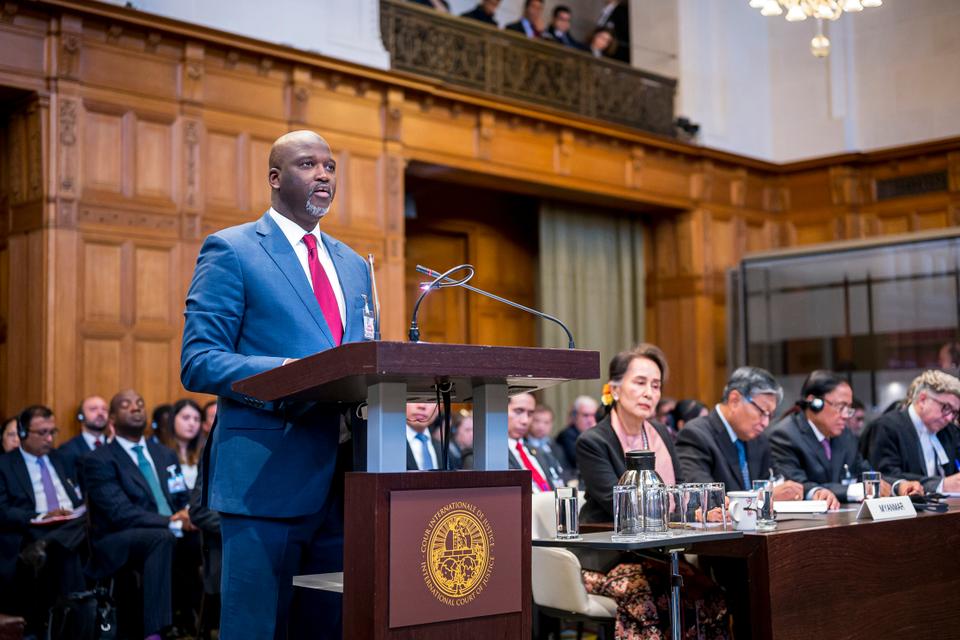ICJ lacking transparency in Rohingya genocide case
https://arab.news/rvb3h

The Gambia has this week taken the next step in its action against Myanmar at the International Court of Justice for the Rohingya genocide by filing a “Memorial” of some 500 pages, plus appendices. This new step is to be celebrated, even though it also serves to highlight some of the shortcomings of the UN’s system of justice.
In recent months, there had been cynical and dismissive noises around the legal action taken by the Gambia: That it was an effort aimed at generating publicity above anything else, and that the action would not be pursued to its ultimate conclusion. Critics highlighted that the Gambian minister who initiated the action at the ICJ, Abubacarr Tambadou, recently quit his role in the government of the Gambia to take up a position with the UN. They jumped on this development to argue that the whole exercise was carried out primarily as a springboard for his career.
However, with this new submission, those fears have been put to rest. The work by the government of the Gambia on the Rohingya genocide case continues unabated and the amount of evidence submitted to the court even at this early stage suggests it is serious about pursuing this action to its conclusion. The Gambia is, without any shadow of doubt, a genuine human rights hero in this story.
Unfortunately, the story does take an unfortunate twist in another of its aspects. We do not get to see any of the evidence or arguments the Gambia has just submitted to the court. Nor will we get to see the response we expect from Myanmar next year. It is a feature of the proceedings of the UN legal bodies that in cases such as this the evidence, at least at this stage, will only be available to the parties directly participating in the legal process — which is to say, only to the governments that are actively prosecuting or defending.
This is extremely unfortunate. No nongovernmental organizations or indeed the very victims of the genocide, the Rohingya themselves, will have the opportunity to review the evidence or to augment it with their own testimony, experiences, and relevant documentary resources. Other minority groups in Myanmar that continue to be assaulted by the federal military of the country will not get to compare their own experiences with those documented by the prosecution. And we all have to simply trust that the process, hidden as it is, is nevertheless fully fair.
On the other hand, it is also not completely unreasonable that, as a default position, defendant states that enjoy the presumption of innocence until proven guilty by the court should not suffer the reputational damage that might come from observers reading allegations by a prosecution as an established fact.
Though that principle is sound, it is well established legal precedent in most countries that there are many cases in which this principle is set aside. This usually happens when the alleged perpetrator may have victimized others who should feel encouraged to come forward with their own evidence and experiences, or when the original victims are believed to still be under immediate threat from the accused or some of their associates. In those cases, a judgment is made, on the balance of harms, that all aspects of a trial should be made public so as to protect suspected victims from further aggression and to encourage anyone else with relevant information to come forward.
The evidence, at least at this stage, will only be available to the parties directly participating in the legal process.
Dr. Azeem Ibrahim
Both these criteria are clearly applicable in this genocide case. There remain some 300,000 Rohingya in internally displaced people’s camps in Myanmar, under the most precarious of conditions. The military of Myanmar could start massacring these people on a moment’s notice. And there are many other ethnic minority groups, especially in border areas, that are currently seeing their civilian villages and towns shelled by the military in ways that are reminiscent of how the Rohingya villages were razed three years ago. This makes a strong case for why the ICJ should look to make public as much of the evidence and the proceedings as possible, as soon as possible.
In the end, for justice to be served and satisfied, justice must also be seen to be done. That is why we must continue to call on the ICJ to open up the proceedings and make them transparent.
- Dr. Azeem Ibrahim is a director at Center for Global Policy in Washington, D.C. Twitter: @AzeemIbrahim









































